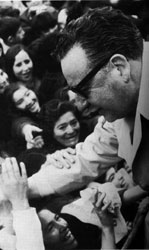O Milagre Económico Chileno.
 Vou mudar o enfoque da discussão, que até aqui tem estado centrada em Pinochet e em Salvador Allende (por causa do revisoniosmo histórico).
Vou mudar o enfoque da discussão, que até aqui tem estado centrada em Pinochet e em Salvador Allende (por causa do revisoniosmo histórico).Apenas mais uma nota: se Allende não foi um democrata, então eu não sei o que é um democrata. Ou dito de outro modo, se ser democrata é seguir o exemplo desses senhores
do CATO Institute e de outros por aí pululam, então pobre democracia, de tão triste e cinzenta; e eu encontro-me certamente num qualquer outro lado da barricada, mesmo que de contornos indefinidos. Parafraseando régio, "Não sei para onde vou Sei que não vou por aí!"
Há o argumento do milagre económico chileno. Não sendo eu especialista em milgares, faço-me socorrer deste artigo. Para esboçar tão-só uma tentativa de compreensão do tal milagre, com que muitos dos tais demcratas tentam espantar as críticas ao regime de Pinochet.
Afinal, na governação do iliberal Allende, a economia até cresceu, não obstante todo caos que imputam a este. subiram os salários e foi reduzida a pobreza. A história é bem diferente depois de Pinochet ter usurpado o poder:
The Chilean Experiment
After his disciples were done with it, Chile was indeed radically transformed…for the worse.
Free market policies subjected the country to two major depressions twice in one decade, first in 1974-75, when GDP fell by 12 per cent, then again in 1982-83, when it dropped by 15 per cent.
Contrary to ideological expectations about free markets and robust growth, average GDP growth in the period 1974-89--the radical Jacobin phase of the Friedman-Pinochet revolution--was only 2.6 per cent, compared to over 4 per cent a year in the period 1951-71, when there was a much greater role of the state in the economy.
By the end of the radical free-market period, both poverty and inequality had increased significantly. The proportion of families living below the “line of destitution” had risen from 12 to 15 per cent between 1980 and 1990, and the percentage living below the poverty line, but above the line of destitution, had increased from 24 to 26 per cent. This meant that at the end of the Pinochet regime, some 40 per cent of Chile’s population, or 5.2 million of a population of 13 million, were poor.
In terms of income distribution, the share of the national income going to the poorest 50 per cent of the population declined from 20.4 per cent to 16.8 per cent, while the share going to the richest ten per cent rose dramatically from 36.5 per cent to 46.8 per cent.
Um outro olhar sobre o milagre aqui:
Tinker Bell, Pinochet and The Fairy Tale Miracle of Chile
In 1973, the year General Pinochet brutally seized the government, Chile’s unemployment rate was 4.3%. In 1983, after ten years of free-market modernization, unemployment reached 22%. Real wages declined by 40% under military rule.
In 1970, 20% of Chile’s population lived in poverty. By 1990, the year “President” Pinochet left office, the number of destitute had doubled to 40%. Quite a miracle.
